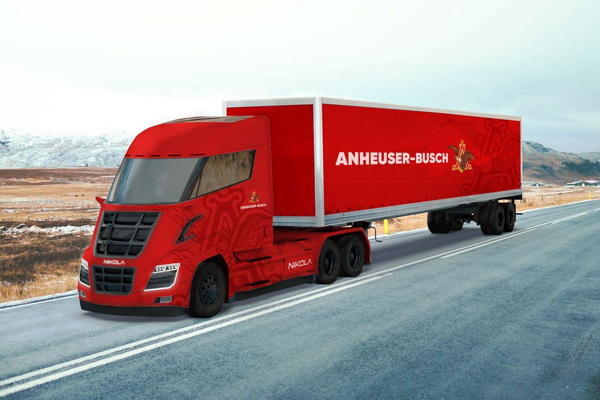Nikola Gets Big Order for 800 Hydrogen Fuel Cells Trucks from Anheuser-Busch
May 07,2018

The beer company said it plans to buy as many as 800 trucks from Nikola Motor Co. Where Tesla uses batteries in its powertrain technology, Phoenix-based Nikola uses hydrogen fuel cells. In both cases, the vehicles generate no tailpipe pollutants.
Tesla and Nikola are vying for share in a market dominated by diesel-fueled trucks.
Ingrid De Ryck, Anheuser-Busch's vice president of procurement and sustainability, said the company plans to convert its entire 800-vehicle company-owned fleet to vehicles that emit no pollution or greenhouse gases by 2025.
The company "plans to reduce carbon emissions by 25% over our entire value chain by 2025," De Ryck said. "This will help us reach our sustainability goals."
The market for heavy duty semi trucks is small and slow-growing. In 2016, 249,952 big trucks were sold in the U.S., the majority using conventional diesel fuel, according to IHS Markit. That represents growth of only 0.6% over the previous year. Alternative-powertrain companies such as Nikola and Tesla have to displace traditional truck makers to gain traction.
"This [order] is a very big deal, and it should be a big kick in the pants for Nikola on its path moving forward," said Antii Lindstrom, who covers trucks for IHS Markit.
Beyond appealing to environmental concerns, electric truck makers must prove that total cost of ownership will be lower than for diesel-powered trucks, even if electric versions are more expensive upfront.
Trevor Milton, Nikola's founder and chief executive, said sales to companies such as Anheuser-Busch help make the case.
Manufacturing capacity, not market acceptance, is the constraint that concerns him. The company plans to build a factory in Buckeye, Ariz., 36 miles west of Phoenix on Interstate 10. It won't be ready for at least three years; Milton said a contractor will manufacture the trucks in the meantime.
Last year, Tesla announced plans to begin producing battery-powered semi trucks in 2019, with a range of 500 miles. Pepsi, Walmart, City Furniture and several other companies in addition to Anheuser-Busch have put down deposits.
Nikola's hydrogen system creates electricity by splitting hydrogen electrons from the protons. Those particles are then combined with ambient air to create water as the waste product.
Milton contends that fuel cells are better for trucking than the battery cells used in most electric vehicles because the system is much lighter. Weight is a key concern in long-range hauling; for one thing, federal law says a fully loaded truck can't weigh more than 80,000 pounds..
But hardly any hydrogen refueling stations exist. Working with Anheuser-Busch, and using its own capital, Nikola plans to build 28 fueling stations along the beer company's heaviest routes. The stations will be usable by fuel-cell vehicles made by other companies. Nikola plans to process its own hydrogen fuel at each station with on-site solar power, wind power or by buying electricity created through renewable sources such as hydropower.
Milton faces some of the same challenges as Elon Musk at Tesla. Where Tesla is putting solar panels on houses to fill storage batteries with energy that are then used to recharge cars, Milton is building a truck-based energy ecosystem.
Milton will have to prove his company can build trucks on time with high quality while managing an entirely new business model involving untested technologies and start producing free cash flow before investment capital runs out.
At the same time, like Tesla, Nikola faces giant competitors: Kenworth, Toyota and other truck makers are planning to enter the fuel cell truck market. (Another connection: Nikola is named after Nikola Tesla, who among many other things is responsible for making alternating current dominant on the electric grid.)
Nikola, meanwhile, is suing Tesla, claiming Musk's company stole its aerodynamic truck design and other intellectual property.
Source : latimes
Views : 6450








